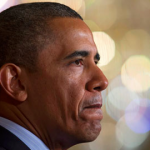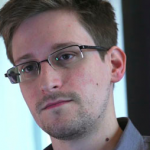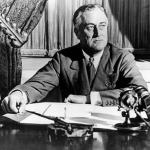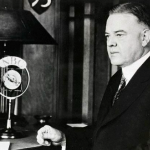Shoshana’s January Slog:
Edward Snowden handed Obama yet another FDR moment when he blew open the door to the NSA. (The Great Recession was his first big FDR opportunity; healthcare was a second. He missed the first one, and the jury is still out on the second.) Obama’s speech showed sensitivity to the larger historical significance of this crisis, but the President’s FDR insights were trivialized by Herbert Hoover prescriptions.
Image may be NSFW.
Clik here to view.
After the crash of 1929 as the Great Depression took hold of the American economy, Hoover rejected the prospect of sweeping bold action. Instead his timid interventions accelerated decline. As economist Brad deLong has pointed out, Hoover’s prescriptions left the world economy in free fall. His programs showed a poor understanding of the systemic nature of the domestic economy and its relation to other economies. Hoover raised taxes, cut spending, and his trade quotas helped plunge the rest of the world into Depression while crippling American exports.
Now Obama’s timid prescriptions leave the Internet in free-fall, as people around the world withdraw their trust from its operations and especially from American companies. Back in the 1930’s it took FDR to grasp that even a market economy lives inside politics and history. It had to be regulated and managed through substantial enduring legislation and oversight. The New Deal completed a multi-decade process of institutionalizing a new social contract for a modern industrial society.
Image may be NSFW.
Clik here to view. In the West, and especially in the US, the Internet too has been treated as some kind of autonomous force, outside the sphere of democratic governance. The overreach of private companies and government surveillance demonstrates that democratic societies have the obligation to impose Constitutional protections on the Internet, or the slow drift into totalitarianism becomes a more real possibility with each dazzling new capability. Once again, this will ultimately require substantial legislation that institutionalizes a new social contract for our new information society and sets the standard for the broader information civilization that will define the next century.
In the West, and especially in the US, the Internet too has been treated as some kind of autonomous force, outside the sphere of democratic governance. The overreach of private companies and government surveillance demonstrates that democratic societies have the obligation to impose Constitutional protections on the Internet, or the slow drift into totalitarianism becomes a more real possibility with each dazzling new capability. Once again, this will ultimately require substantial legislation that institutionalizes a new social contract for our new information society and sets the standard for the broader information civilization that will define the next century.
In the run-up to Obama’s January 17 speech on NSA data collection programs, I argued in the Frankfurter Allgemeine Zeitung (English version here) that the debate over the NSA is the tip of the iceberg in a much larger discussion. We are in the transition from an industrial to an information civilization, and the character of this new civilization is deeply contested. Will we be the masters of information or will we be its slaves? Are we heading toward a totalitarian future buttressed by a new fusion of corporate and state interests with increased social stratification and the social relations of the surveillance paradigm? Or is there still hope for a future that draws on the democratizing and empowering potential of the digital?
The NSA debate is one early signal of this larger epochal crisis. Thanks to Snowden we now know that the NSA is well on its way to becoming a free-standing global surveillance empire. We also know that Big Tech is following close behind and is poised to catch up with the ominously titled “Internet of Everything.”
Image may be NSFW.
Clik here to view.
Americans’ hopes for the future, and the world’s, require an FDR-like sweeping reexamination of the origins, legitimacy, and effectiveness of intelligence data gathering. We also need substantial legislative initiatives that protect citizens from the predations of Big Tech, whose data sweeps are on a trajectory to become functionally indistinguishable from militarized government data. If Obama does not take the lead, it will fall to Angela Merkel and the leaders of the EU, as the U.S. limps through the decade in search of epochal leadership.
Obama’s FDR opportunity is to engage in the depth and breadth of intervention and reinvention that enshrine trust, rationality, democratic governance, and consumer sovereignty. This means eliminating the secret ubiquitous information access, storage, and intrusive meta-analysis perpetrated by the government and by companies. It means legislation that guarantees transparency, informed choice, public oversight, and individual control. As we have learned during these last months of revelations, NSA, police, and private sector surveillance activities are by now deeply enmeshed and threaten to become the foundation of a full blown surveillance state.
Image may be NSFW.
Clik here to view.
Obama’s January 17 speech provided an important glimpse of his understanding of the larger significance of this moment. But the speech was perplexing for the dispiriting juxtaposition of his FDR insights and Herbert Hoover prescriptions. Here are the key examples of Obama’s FDR-like grasp of the historical transition and its most trenchant challenges:
“… the power of new technologies means that there are fewer and fewer technical constraints on what we can do. That places a special obligation on us to ask tough questions about what we should do.”
“…in the absence of institutional requirements for regular debate — and oversight that is public, as well as private or classified — the danger of government overreach becomes more acute.”
“… surveillance technology and our reliance on digital information is evolving much faster than our laws.”
“This effort will not be completed overnight, and given the pace of technological change, we shouldn’t expect this to be the last time America has this debate.”
“Given the unique power of the state, it is not enough for leaders to say: Trust us, we won’t abuse the data we collect. For history has too many examples when that trust has been breached. Our system of government is built on the premise that our liberty cannot depend on the good intentions of those in power; it depends on the law to constrain those in power.”
“When you cut through the noise, what’s really at stake is how we remain true to who we are in a world that is remaking itself at dizzying speed…So while the reforms that I have announced will point us in a new direction, I am mindful that more work will be needed in the future.”
“As the nation that developed the Internet, the world expects us to ensure that the digital revolution works as a tool for individual empowerment, not government control. Having faced down the dangers of totalitarianism and fascism and communism, the world expects us to stand up for the principle that every person has the right to think and write and form relationships freely — because individual freedom is the wellspring of human progress.”
“For more than two centuries, our Constitution has weathered every type of change because we have been willing to defend it, and because we have been willing to question the actions that have been taken in its defense. Today is no different.”
But these valuable insights were fatally compromised by a Hoover-like inclination to fine-tune, persuade, ignore, trivialize, patronize, fear-monger, and, despite the rhetoric, rely on good intentions, rather than to fundamentally question the powers that have accrued to the NSA and private companies. The President’s prescriptions leave nearly all current capabilities in place, along with large loopholes where new practices are imposed. Nor is there any future blueprint for comprehensive debate and review of the many dimensions of the emerging surveillance state –– including commerce and government –– and the kinds of legislative and regulatory protections that will be required if democracy is to be preserved for another century.
Image may be NSFW.
Clik here to view.
So far, President Obama’s interventions rely on Presidential Directives, panels, administrative organization, and verbal recommendations –– all measures that can simply be overridden by another President. Here are a few examples of these Hoover-like prescriptions:
“…we will review decisions about intelligence priorities and sensitive targets on an annual basis so that our actions are regularly scrutinized by my senior national security team.”
“I am also calling on Congress to authorize the establishment of a panel of advocates from outside government to provide an independent voice in significant cases before the Foreign Intelligence Surveillance Court.”
“I am asking the Attorney General and DNI to institute reforms that place additional restrictions on government’s ability to retain, search, and use in criminal cases communications between Americans and foreign citizens incidentally collected under Section 702.”
“I have therefore directed the Attorney General to amend how we use national security letters so that this secrecy will not be indefinite, so that it will terminate within a fixed time unless the government demonstrates a real need for further secrecy.”
“ I have instructed the intelligence community and the Attorney General to use this transition period to develop options for a new approach that can match the capabilities and fill the gaps that the Section 215 program was designed to address…”
“…the new presidential directive that I’ve issued today will clearly prescribe what we do, and do not do, when it comes to our overseas surveillance.”
“ I’ve directed the DNI, in consultation with the Attorney General, to develop these safeguards, which will limit the duration that we can hold personal information, while also restricting the use of this information.”
“I have made clear to the intelligence community that unless there is a compelling national security purpose, we will not monitor the communications of heads of state and government of our close friends and allies.”
“I am making some important changes to how our government is organized.”
“…unless there is a compelling national security purpose, we will not monitor the communications of heads of state and government of our close friends and allies.”
Some Congressional leaders would like to divert the public’s attention from these matters of real gravity, with unsubstantiated allegations about Edward Snowden’s motives. Discredit the messenger and ignore the message. It’s not exactly a new tactic. The fact is that the debate we’ve begun will ebb and flow, but it will not be permanently silenced or derailed. History is too insistent. Too many minds are switched on. Too much is at stake.
Here’s what everyone should know: this is the beginning, not the end, not even the middle. Not even close. We are at a turning point, but we’re turning the Titanic, not a Porsche. This civilizational transition will require every ounce of energy we have for debate, action, and invention. This is not the fight of the twittering class. Everyone’s future is on the line; no one is exempt. This debate strikes deep at the raw heart of every dream we each hold for the century to come.